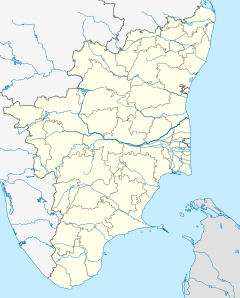Ninra Narayana Perumal temple
| Ninra Narayana Perumal Temple | |
|---|---|

The gateway tower of the temple with a flight of steps
|
|
| Geography | |
| Coordinates | 9°28′52″N 77°48′47″E / 9.481°N 77.813°ECoordinates: 9°28′52″N 77°48′47″E / 9.481°N 77.813°E |
| Country | India |
| State | Tamil Nadu |
| District | Virudhunagar |
| Location | Thiruthangal |
| Culture | |
| Poets | Thirumangai Alwar(4) Boothathazwar(1) |
| Architecture | |
| Architectural styles | Dravidian architecture |
| Inscriptions | 3 |
Ninra Narayana Perumal Temple (also called Nindra Narayana Perumal temple) or Thiruthankaal in Thiruthangal, a town in the outskirts of Sivakasi in the South Indian state of Tamil Nadu, is dedicated to the Hindu god Vishnu. Constructed in the Dravidian style of architecture, the temple is glorified in the Divya Prabandha, the early medieval Tamil canon of the Azhwar saints from the 6th–9th centuries AD. It is one of the 108 Divyadesam dedicated to Vishnu, who is worshipped as Ninra Narayana and his consort Lakshmi as Arunakamala Mahadevi.
The temple in its present form was believed to have been built by Devendra Vallabha, a Pandya king. The temple has three inscriptions in its two rock-cut caves, two dating from the period of 8th century.
The temple is built on a granite hill 100 ft (30 m) tall and a granite wall surrounds the temple, enclosing all its shrines and bodies of water. Unlike other temples, this temple does not have a rajagopuram, the temple's gateway tower. The later Pandya kings, Vijayanagar and Nayak kings in the region made significant additions to the temple. The temple is located on the other side of Karunellinathar temple, a famous Shiva temple and can be reached from that temple on the hillock.
Ninra Narayana is believed to have appeared to Sridevi and Bhoomadevi. Four daily rituals and many yearly festivals are held at the temple, of which the Vaikasi Vasanthothsavam, Pillai Lokacharyar festival and Kurathazhwar festival, each celebrated for ten days, being the most prominent. The temple is maintained and administered by the Hindu Religious and Endowment Board of the Government of Tamil Nadu.
As per Hindu legend, there was a competition among the consorts of Vishnu namely Sridevi, Bhoodevi and Neeladevi on the degree of their devotion to Vishnu. Sridevi descended down to earth and repaired a sequestrated spot surrounded by paddy fields. She sat in devotion and influenced by her power of worship, all sages started worshipping her at the place. Realising that living alone would be improper, she engendered a theertha (water body) and propitiated Vishnu. Pleased by her devotion, Vishnu appeared at the spot. Bhudevi and Neeladevi followed her footsteps and acceded that Sridevi was the most devoted among them. Vishnu desired and stayed (thangal in Tamil) along with his consorts in the place. As per another legend, Ranganatha from Srirangam Ranganathaswamy temple was enamoured by the devotion of Andal. He started a journey to Srivilliputhur Divya Desam to seek her hand for marriage. While reaching the place, it became dark and he decided to spend the night in the place. Since he stayed at this place, it came to be known as Thiruthangal and the hillock came to be known as Thalagiri. As per another legend, Krishna's grandson Anirudhha, got married at this place.
...
Wikipedia

